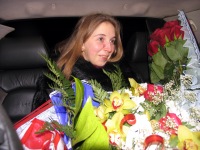Много букв про Песах.
Сегодня первый день Песаха - праздника свободы, весны и мацы. В незапамятное время вышли евреи из Египта, где жили в рабстве, и направились в место, где жили когда-то их предки, в землю обетованную, "текущую молоком и мёдом". Несли с собой, в частности, тесто, которое замесили и тут же забрали, а оно ещё не успело закваситься. Шли сорок лет, хотя расстояние, которое им требовалось преодолеть, даже пешком проходится существенно быстрее. Но бродили по пустыне, пока не забыли, как это - быть рабами, чтобы начать новую жизнь в новой стране свободными людьми.
Праздник Песах отмечается восемь дней, и верующие евреи до него стараются убрать из дома всё хлебное - без разницы, это хлеб сам по себе или бутылки кваса. Хлебные крошки на всякий случай ищутся даже там, где их быть вроде как не может, в углу детской или в рабочем кабинете. Углы и труднодоступные места исследуют перышком, освещая свечкой.
В канун первого дня Песаха все собираются за столом, но не для обычного ужина, а для специальной трапезы, во время которой каждый должен выпить четыре бокала красного вина (или виноградного сока), вкусить определенную еду, находящуюся на специальной тарелке, читать Агаду - книгу, в которой описываются события исхода из Египта. Да, чтение за столом иногда прямо вписано в культуру, да ещё в праздничном ритуале. В тарелке же будет яйцо вкрутую, сильно зажаренный кусочек мяса с костью внутри, горькая зелень типа кресс-салата или рукколы, петрушка или картофель, сладкая фруктовая смесь вроде яблок с орехами. Также в обязательный набор как этой трапезы, так и последующих дней Песаха, входит маца. Она делается из пшеничной муки и воды в течение восемнадцати минут, чтобы не заквасилась, это тонкие плотные листы, ломкие, пресные на вкус. Мы их в детстве бросали и в молоко, и в бульон. Из мацы можно сделать много вкусностей, начиная от классических кнейдлах (шары из мацы, сваренные в бульоне), и заканчивая тортами из мацы, а можно ничего из неё не делать, просто грызть, грызть, грызть...
Специальная трапеза называется "седер", то есть, "порядок", из-за того, что заранее известно, когда руки моются, когда маца ломается, когда что едят. Вчера у всех верующих евреев в мире был седер.
У детей есть особая роль в этот вечер. Во-первых, задавать вопросы типа "чем отличается эта ночь от других ночей". Вопросы придумывать не надо, их уже столетиями задают одни и те же. Во-вторых, взрослые в начале трапезы прячут кусочек мацы, а дети в конце должны найти его. Вообще стараются сделать так, чтобы детям было не скучно.
Так отмечают освобождение от рабства.
И песни поют. Я одну прикрепила ниже. В ней - о том, что если бы Бог сделал только что-то одно, например, только вывел из Египта, или только даровал Тору, или только кормил манной во время путешествия по пустыне, этого было бы уже достаточно.
У Песаха есть и некоторые невеселые особенности. Из средневековья, если даже не раньше, тянется идея, что евреи используют для выпечки мацы кровь христианских (чаще речь идет о христианских) младенцев. Не сказать, что это "только слухи", в частности, на в начале двадцатого века был судебный процесс над человеком, которого обвиняли в убийстве ребенка с ритуальными целями (в итоге - оправдали). Желающие могут погуглить "дело Бейлиса". Идеи такого рода живучи, в совокупности называются "Кровавый навет", но надо понимать ровно три вещи.
1. В "десяти заповедях" прямо запрещено убийство.
2. Евреям запрещено употребление крови (вообще любой) в пищу.
3. Евреям запрещены человеческие жертвоприношения.
Во времена Первого храма (Х-VI в. до н.э.) на Песах практиковались жертвоприношения барашков, и то событие сейчас символизирует тот самый сильно зажаренный кусочек мяса с косточкой внутри, лежащий на тарелке во время седера, см. выше. И это всё.
После разрушения второго храма (70 г. н.э.) жертвоприношения не осуществляются.
Это не очень-то похоже на текст по случаю праздника, но я поняла, что не могу не написать об этом.
Однако, с Песахом тех, кто празднует! Станем ещё немного свободнее.
Сегодня первый день Песаха - праздника свободы, весны и мацы. В незапамятное время вышли евреи из Египта, где жили в рабстве, и направились в место, где жили когда-то их предки, в землю обетованную, "текущую молоком и мёдом". Несли с собой, в частности, тесто, которое замесили и тут же забрали, а оно ещё не успело закваситься. Шли сорок лет, хотя расстояние, которое им требовалось преодолеть, даже пешком проходится существенно быстрее. Но бродили по пустыне, пока не забыли, как это - быть рабами, чтобы начать новую жизнь в новой стране свободными людьми.
Праздник Песах отмечается восемь дней, и верующие евреи до него стараются убрать из дома всё хлебное - без разницы, это хлеб сам по себе или бутылки кваса. Хлебные крошки на всякий случай ищутся даже там, где их быть вроде как не может, в углу детской или в рабочем кабинете. Углы и труднодоступные места исследуют перышком, освещая свечкой.
В канун первого дня Песаха все собираются за столом, но не для обычного ужина, а для специальной трапезы, во время которой каждый должен выпить четыре бокала красного вина (или виноградного сока), вкусить определенную еду, находящуюся на специальной тарелке, читать Агаду - книгу, в которой описываются события исхода из Египта. Да, чтение за столом иногда прямо вписано в культуру, да ещё в праздничном ритуале. В тарелке же будет яйцо вкрутую, сильно зажаренный кусочек мяса с костью внутри, горькая зелень типа кресс-салата или рукколы, петрушка или картофель, сладкая фруктовая смесь вроде яблок с орехами. Также в обязательный набор как этой трапезы, так и последующих дней Песаха, входит маца. Она делается из пшеничной муки и воды в течение восемнадцати минут, чтобы не заквасилась, это тонкие плотные листы, ломкие, пресные на вкус. Мы их в детстве бросали и в молоко, и в бульон. Из мацы можно сделать много вкусностей, начиная от классических кнейдлах (шары из мацы, сваренные в бульоне), и заканчивая тортами из мацы, а можно ничего из неё не делать, просто грызть, грызть, грызть...
Специальная трапеза называется "седер", то есть, "порядок", из-за того, что заранее известно, когда руки моются, когда маца ломается, когда что едят. Вчера у всех верующих евреев в мире был седер.
У детей есть особая роль в этот вечер. Во-первых, задавать вопросы типа "чем отличается эта ночь от других ночей". Вопросы придумывать не надо, их уже столетиями задают одни и те же. Во-вторых, взрослые в начале трапезы прячут кусочек мацы, а дети в конце должны найти его. Вообще стараются сделать так, чтобы детям было не скучно.
Так отмечают освобождение от рабства.
И песни поют. Я одну прикрепила ниже. В ней - о том, что если бы Бог сделал только что-то одно, например, только вывел из Египта, или только даровал Тору, или только кормил манной во время путешествия по пустыне, этого было бы уже достаточно.
У Песаха есть и некоторые невеселые особенности. Из средневековья, если даже не раньше, тянется идея, что евреи используют для выпечки мацы кровь христианских (чаще речь идет о христианских) младенцев. Не сказать, что это "только слухи", в частности, на в начале двадцатого века был судебный процесс над человеком, которого обвиняли в убийстве ребенка с ритуальными целями (в итоге - оправдали). Желающие могут погуглить "дело Бейлиса". Идеи такого рода живучи, в совокупности называются "Кровавый навет", но надо понимать ровно три вещи.
1. В "десяти заповедях" прямо запрещено убийство.
2. Евреям запрещено употребление крови (вообще любой) в пищу.
3. Евреям запрещены человеческие жертвоприношения.
Во времена Первого храма (Х-VI в. до н.э.) на Песах практиковались жертвоприношения барашков, и то событие сейчас символизирует тот самый сильно зажаренный кусочек мяса с косточкой внутри, лежащий на тарелке во время седера, см. выше. И это всё.
После разрушения второго храма (70 г. н.э.) жертвоприношения не осуществляются.
Это не очень-то похоже на текст по случаю праздника, но я поняла, что не могу не написать об этом.
Однако, с Песахом тех, кто празднует! Станем ещё немного свободнее.
A lot of letters about Passover.
Today is the first day of Pesach - the festival of freedom, spring and matzo. In immemorial time, the Jews came out of Egypt, where they lived in slavery, and went to the place where their ancestors once lived, to the promised land, "flowing with milk and honey." They carried with them, in particular, the dough, which they kneaded and immediately took away, but it had not yet had time to ferment. They walked for forty years, although the distance that they needed to overcome was even faster on foot. But they wandered through the desert until they forgot how it is to be slaves in order to start a new life in a new country by free people.
Pesach is celebrated for eight days, and the Jews before it are trying to remove all the bread from the house - it doesn’t matter whether it is bread in itself or bottles of kvass. Just in case, bread crumbs are searched even where they cannot be, in the corner of a nursery or in a study. Corners and hard-to-reach places are explored with a feather, lighting a candle.
On the eve of the first day of Pesach, everyone gathers at the table, but not for an ordinary dinner, but for a special meal, during which everyone has to drink four glasses of red wine (or grape juice), taste a certain meal on a special plate, read Agadu - a book which describes the events of the exodus from Egypt. Yes, reading at the table is sometimes directly inscribed in the culture, and even in a festive ritual. In the plate there will be a hard-boiled egg, a strongly fried slice of meat with a bone inside, bitter greens such as watercress or arugula, parsley or potatoes, a sweet fruit mixture like apples and nuts. Also in the mandatory set of this meal, and the next days of Passover, is matzah. It is made from wheat flour and water for eighteen minutes so that it does not ferment, it is thin dense sheets, brittle, fresh in taste. As children we threw them both into milk and broth. You can make many delicacies from a matzo, ranging from classic kniidlah (balls made from matzoh, cooked in broth) to cakes made from matzoh, but you can not do anything from it, just nibble, nibble, nibble ...
A special meal is called "seder", that is, "order", because it is known in advance when hands wash, when matzoah breaks, when what is eaten. Yesterday, all Jewish believers in the world had a seder.
Children have a special role this evening. First, to ask questions like "how is this night different from other nights". There is no need to invent questions, they have been asked the same for centuries. Secondly, adults at the beginning of the meal hide a piece of matzoh, and children at the end should find it. In general, trying to make sure that children are not bored.
So mark the liberation from slavery.
And the songs are sung. I attached one below. It says that if God only did one thing, for example, only brought it out of Egypt, or only bestowed Torah, or only fed manna while traveling in the desert, that would be enough.
Pesach has some sad features. From the Middle Ages, if not even earlier, the idea is being drawn that the Jews use the blood of Christian (most often Christian) babies to bake matzoh. Not to say that this "only rumor", in particular, at the beginning of the twentieth century was a trial of a man who was accused of killing a child with ritual goals (in the end, he was acquitted). Those interested can google the case of Beilis. Ideas of this kind are tenacious, collectively called Blood Libel, but you need to understand exactly three things.
1. In the "Ten Commandments" murder is expressly prohibited.
2. Jews are prohibited from consuming blood (generally any) for food.
3. Hebrews are forbidden human sacrifices.
During the time of the First Temple (X-VI century BC), lamb sacrifices were practiced on Pesach, and that event now symbolizes that very strongly fried piece of meat with a bone inside, lying on a plate during the Seder, see above. And it's all.
After the destruction of the second temple (70 AD), the sacrifices are not carried out.
This is not very similar to the text on the occasion of the holiday, but I realized that I can not write about it.
However, with Pesach those who celebrate! Let's become a little more free.
Today is the first day of Pesach - the festival of freedom, spring and matzo. In immemorial time, the Jews came out of Egypt, where they lived in slavery, and went to the place where their ancestors once lived, to the promised land, "flowing with milk and honey." They carried with them, in particular, the dough, which they kneaded and immediately took away, but it had not yet had time to ferment. They walked for forty years, although the distance that they needed to overcome was even faster on foot. But they wandered through the desert until they forgot how it is to be slaves in order to start a new life in a new country by free people.
Pesach is celebrated for eight days, and the Jews before it are trying to remove all the bread from the house - it doesn’t matter whether it is bread in itself or bottles of kvass. Just in case, bread crumbs are searched even where they cannot be, in the corner of a nursery or in a study. Corners and hard-to-reach places are explored with a feather, lighting a candle.
On the eve of the first day of Pesach, everyone gathers at the table, but not for an ordinary dinner, but for a special meal, during which everyone has to drink four glasses of red wine (or grape juice), taste a certain meal on a special plate, read Agadu - a book which describes the events of the exodus from Egypt. Yes, reading at the table is sometimes directly inscribed in the culture, and even in a festive ritual. In the plate there will be a hard-boiled egg, a strongly fried slice of meat with a bone inside, bitter greens such as watercress or arugula, parsley or potatoes, a sweet fruit mixture like apples and nuts. Also in the mandatory set of this meal, and the next days of Passover, is matzah. It is made from wheat flour and water for eighteen minutes so that it does not ferment, it is thin dense sheets, brittle, fresh in taste. As children we threw them both into milk and broth. You can make many delicacies from a matzo, ranging from classic kniidlah (balls made from matzoh, cooked in broth) to cakes made from matzoh, but you can not do anything from it, just nibble, nibble, nibble ...
A special meal is called "seder", that is, "order", because it is known in advance when hands wash, when matzoah breaks, when what is eaten. Yesterday, all Jewish believers in the world had a seder.
Children have a special role this evening. First, to ask questions like "how is this night different from other nights". There is no need to invent questions, they have been asked the same for centuries. Secondly, adults at the beginning of the meal hide a piece of matzoh, and children at the end should find it. In general, trying to make sure that children are not bored.
So mark the liberation from slavery.
And the songs are sung. I attached one below. It says that if God only did one thing, for example, only brought it out of Egypt, or only bestowed Torah, or only fed manna while traveling in the desert, that would be enough.
Pesach has some sad features. From the Middle Ages, if not even earlier, the idea is being drawn that the Jews use the blood of Christian (most often Christian) babies to bake matzoh. Not to say that this "only rumor", in particular, at the beginning of the twentieth century was a trial of a man who was accused of killing a child with ritual goals (in the end, he was acquitted). Those interested can google the case of Beilis. Ideas of this kind are tenacious, collectively called Blood Libel, but you need to understand exactly three things.
1. In the "Ten Commandments" murder is expressly prohibited.
2. Jews are prohibited from consuming blood (generally any) for food.
3. Hebrews are forbidden human sacrifices.
During the time of the First Temple (X-VI century BC), lamb sacrifices were practiced on Pesach, and that event now symbolizes that very strongly fried piece of meat with a bone inside, lying on a plate during the Seder, see above. And it's all.
After the destruction of the second temple (70 AD), the sacrifices are not carried out.
This is not very similar to the text on the occasion of the holiday, but I realized that I can not write about it.
However, with Pesach those who celebrate! Let's become a little more free.
У записи 18 лайков,
1 репостов,
925 просмотров.
1 репостов,
925 просмотров.
Эту запись оставил(а) на своей стене Ася Аксельрод







































